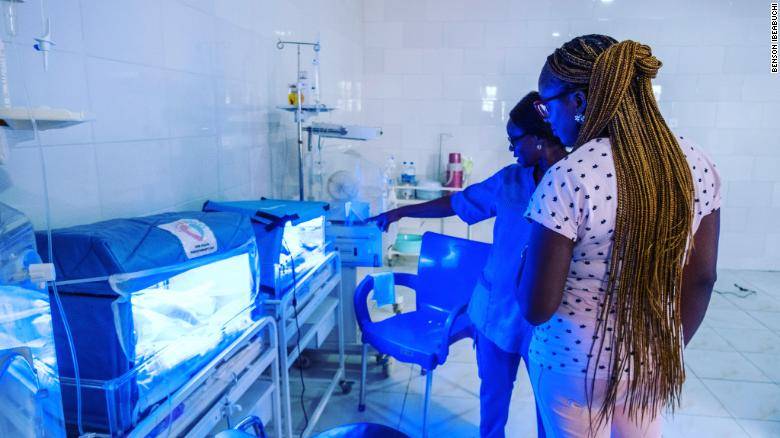In 2015, Virtue Oboro experienced every mother's worst nightmare: at just 48 hours old, her newborn son was rushed into hospital for emergency treatment.
Her son, Tombra, was diagnosed with jaundice, a common condition affecting more than 60% of newborns worldwide. Many cases are mild and resolve on their own, but more serious cases require phototherapy, where babies are placed under blue light.
It's a simple, effective treatment -- but in some places, including Oboro's home country of Nigeria, access to the necessary equipment isn't always possible. Not getting treatment can lead to irreversible health problems including hearing loss, vision impairment, brain damage and cerebral palsy. In rare cases, it can lead to death.
Tombra's case was severe, but there were no phototherapy units available and the family waited four hours while his condition deteriorated.
Eventually, he was given an emergency blood transfusion -- a risky surgery that bought valuable time until a phototherapy unit became available. Oboro says she had to buy the bulb herself, and power outages meant the unit was off for several hours during Tombra's seven-day treatment.
Virtue Oboro, pictured, co-founded Tiny Hearts with her husband after their own traumatizing experience with neonatal jaundice.
Despite the many obstacles, her son, now six, made a full recovery. But Oboro says the experience was traumatizing -- and it inspired her to change careers.
Driven by a new mission to save babies from jaundice, she created the Crib A'Glow: a portable, affordable, solar-powered phototherapy unit, which treats jaundice using blue LED lights.
"I felt like some of the things (I experienced) could have been avoided, or the stress level could be reduced," she says. "I thought, is there something I could do to make the pain less for the babies and the mothers?"
Oboro's experience with power outages and broken equipment isn't uncommon in Nigeria, says Hippolite Amadi, a professor of bioengineering at Imperial College, London, who specializes in neonatal medicine and has worked with neonatal centers in Nigeria for over 20 years.
Parents often have to travel long distances to get to a hospital, not all of which have phototherapy units and neonatal specialists, says Amadi. "One can find large numbers of obsolete or dysfunctional systems being applied at some of these centers," he says, adding that by his estimates, "less than 5% of all Nigerian facilities has sufficient functional phototherapy devices" to serve needy patients.
Oboro founded her company Tiny Hearts in 2016, shortly after Tombra's recovery, and began developing the phototherapy cribs.
As a visual designer, Oboro says she struggled with the medical technicalities. However, her husband had experience working with solar energy and was on hand to help. Oboro also worked with a pediatrician to make sure the device was safe and in line with current phototherapy guidelines.




